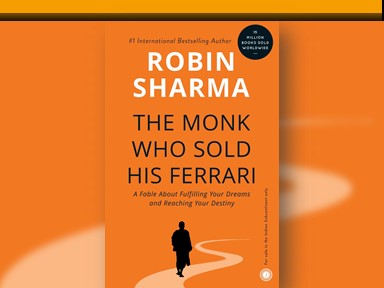
Human beings are always in a race with each other or with time to achieve their targets or the objectives they have in mind. Only a life-changing or life-threatening event or mishappening which forces them to confinement or brings a halt in their fast-moving life is what makes them stop and ponder over life and question its meaning like an existentialist. There are ample number of films that try to show this. To some extent, relating the life of late Apple CEO, Steve Jobs to this context would not be wrong. The same happens with the protagonist, Julian Mantle in Robin Sharma’s bestseller book, “The Monk Who Sold His Ferrari.” The title gives a little hint at the plotline of a person who gives up all the luxuries the materialistic world has to offer and perhaps goes on to renounce the world and live as an ascetic. More or less, this is the kind of transformation that the readers do get to see in the book.
The subtitle of the book “A Fable About Fulfilling Your Dreams and Reaching Your Destiny” is more than enough to give a fair idea about what the book is going to be about. No one knows their destiny. But everyone strives to achieve what they dream of and consider that their destiny. Having peace of mind on the journey of accomplishment of goals appears to be the central premise of the book. The blurb of the book gives enough idea for the reader to know what is in store and decide whether he wants to take up the reading or not. In light of this, the author has crafted the story in a lucid manner in “The Monk Who Sold His Ferrari”.
The interesting thing to observe through the book is that the author has very smoothly connected the ancient and the modern in a very crisp manner. The book is short in comparison to the number of ideas that have been written and the basic thought here is to go back to the roots and that ultimately, going back to ancient wisdom is what everyone has to do. Few books have been written which smoothly manage to amalgamate the two different times. Yet, one message seems clear, that life among the modern world luxuries and facilities may seem to be tempting, but only when one goes back to basics, he can get closer to himself/herself and nature.
Time and again, the narration of “The Monk Who Sold His Ferrari” continues but since the book belongs to the self-help genre, the author has given lines of fine wisdom which the readers may end up underlining to get back and read them again. Some of these powerful lines include,
“The best antidote for fear is knowledge”
And
“Success cannot be pursued; success ensues. It flows as the unintended byproduct of efforts concentrated in the direction of a worthy cause.”
Also,
“It’s better to be a lion for a day than a sheep all your life.” Other than that, “If you want to improve your life and live with all that you deserve, you must run your own race.”
Another powerful line,
“It doesn’t matter what other people say about you. What is important is what you say to yourself, being comfortable in your own skin.”
Likewise, Sharma has written lines here and there throughout the text which have universal applicability and can help a person with any kind of crisis or need. In light of this, the value of the book as one important read in a lifetime can not be undermined.
Some readers may not find the book to be useful in their lives but for some, it may turn out to be life-changing. The point is to take up the good things and the important messages the author has to share and apply them and help selves. Reading books of this kind can always help in being a life changer and motivate a reader very strongly. In the modern genre of self-help/motivational literature, this book would not be second to any.
The language of “The Monk Who Sold His Ferrari” is simple and easy to read which opens and widens the appeal to readers from all age groups. The writing of the book is such that the youngest of the young reader and aged readers can find something or the other in the book for themselves. The character development is not so much, and they remain visibly flat. In the present time when everyone is worried caught up in the rat race to get better than the other, this book becomes a must-have on everyone’s bookshelves, so that, whenever they feel in low spirits, they can go back to this book and complete it feeling pumped up with energy.